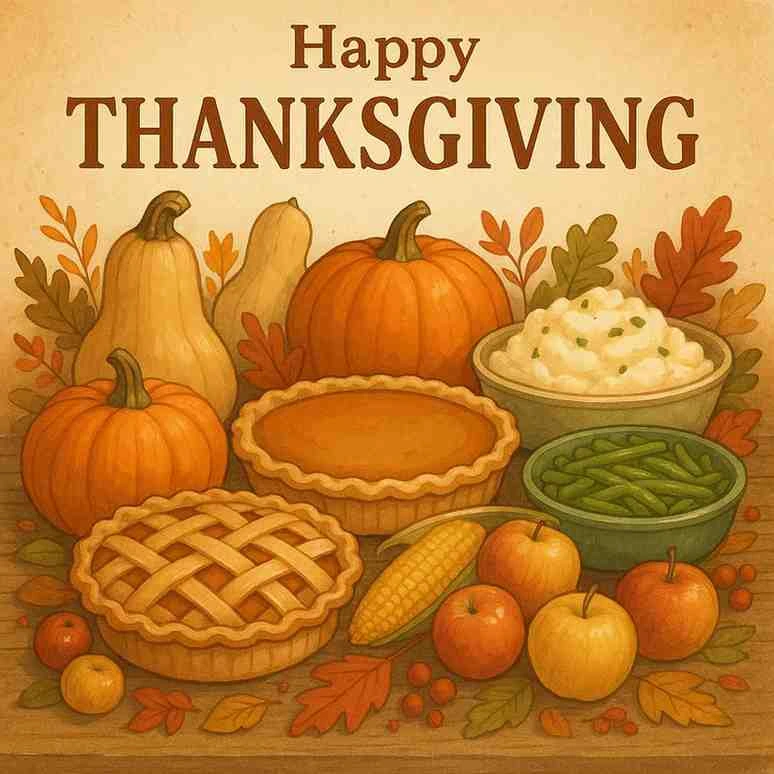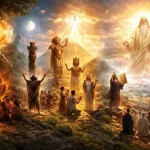Thanksgiving: A Celebration of Gratitude, Community, and Shared Humanity
Thanksgiving is one of the most cherished cultural celebrations in the United States, observed every year on the fourth Thursday of November. In 2025, Thanksgiving Day will be celebrated on November 27, 2025. This day, although rooted in early American history, has expanded far beyond its original meaning to become a festival that symbolizes gratitude, community bonding, and the universal human desire to appreciate life’s blessings. While it is often considered an American holiday, its themes speak to people from every culture, religion, and background across the world.
The origins of Thanksgiving date back to 1621, when the English settlers known as Pilgrims held a harvest feast in Plymouth, Massachusetts. After suffering a brutal winter, food shortages, and illness, the Pilgrims managed to cultivate a successful harvest with the help of the Wampanoag Native Americans. Historical records mention that the Wampanoag tribe played a crucial role in teaching the settlers farming techniques suitable for the new land. To celebrate survival, cooperation, and abundance, the Pilgrims organized a three-day feast, which is today regarded as the inspiration for the modern Thanksgiving holiday. This event, though simple, represented a historic moment of unity between two cultures.
Thanksgiving became more formally recognized centuries later. During the American Civil War, President Abraham Lincoln, seeking a way to bring emotional healing to a divided nation, declared Thanksgiving a national holiday in 1863. He emphasized the importance of expressing gratitude even in difficult times. Later, in 1941, the U.S. Congress officially fixed the date as the fourth Thursday of November. This is why the festival falls on different dates each year, but always within the same week of November.
Although Thanksgiving’s origins are connected to Christian settlers, it is important to understand that the modern celebration is not a religious holiday. It is a secular, cultural festival celebrated by millions of Americans regardless of their faith. In the United States today, people from diverse religions—Christianity, Islam, Hinduism, Judaism, Buddhism, Sikhism, Jainism, and many others—participate in Thanksgiving traditions, often blending their own cultural foods and rituals into the celebration. The festival has grown into a day focused on shared humanity rather than religious identity.
A core element that gives Thanksgiving its unique meaning is the expression of gratitude. Families and friends gather to appreciate one another and acknowledge the blessings—big or small—that life has offered throughout the year. For many, it is a moment of mindful reflection, similar to gratitude practices found across world religions. In Christianity, giving thanks to God is central to prayer and worship. In Islam, the concept of “Shukr”, or expressing gratitude to Allah, forms a foundation of spiritual life. Hinduism celebrates thankfulness through harvest festivals like Pongal and Makar Sankranti. Buddhism encourages mindfulness and acknowledging interconnectedness, while Judaism’s festival of Sukkot shares striking similarities with Thanksgiving as a celebration of harvest and divine blessings. These connections highlight that gratitude is a universal spiritual value, even when wrapped in cultural traditions.
Modern Thanksgiving celebrations revolve around togetherness. Families make special efforts to reunite, often traveling long distances. In fact, it is one of the busiest travel periods of the year in the United States. The centerpiece of the celebration is the Thanksgiving meal, traditionally featuring roast turkey, seasonal vegetables, cranberry sauce, and pies. While turkey is the symbolic dish, many families include foods representing their cultural heritage—Indian spices, Middle Eastern dishes, Mexican flavors, African recipes, or Asian home cooking. This diverse culinary table reflects the multicultural identity of modern America.
Another important part of Thanksgiving is the spirit of service. Many people volunteer at food banks, donate meals to the homeless, or participate in community service programs. This tradition of generosity mirrors the festival’s historical roots, where cooperation and sharing ensured survival. Today, these acts of kindness serve as reminders that gratitude is not only about acknowledging blessings but also about extending support to others.
Thanksgiving has also become a cultural event marked by parades, music, and entertainment. The Macy’s Thanksgiving Day Parade, held annually in New York City since 1924, is broadcast nationwide and watched by millions. American football games are another major part of the day, contributing to the festive atmosphere. Schools organize plays and programs that retell the Thanksgiving story, helping younger generations understand the holiday’s significance.
Even though Thanksgiving is primarily celebrated in the United States, the themes of gratitude and harvest are recognized around the world through similar festivals. India celebrates Onam and Pongal, Japan observes Labor Thanksgiving Day, Korea celebrates Chuseok, China honors the Mid-Autumn Festival, and many African cultures mark harvest seasons with communal feasts. These global parallels show that the need to pause, appreciate nature’s gifts, and celebrate community is deeply rooted in human culture.
As society continues to change, Thanksgiving remains a reminder of values that never lose relevance: gratitude, humility, kindness, and unity. It encourages people to look beyond daily challenges and acknowledge the good—whether it is family, health, opportunity, or simple moments of peace. In a world often divided by differences, the festival stands as a powerful symbol of shared humanity. The message of Thanksgiving goes beyond food and celebration; it invites everyone to remember that gratitude is a bridge that connects hearts, cultures, and communities across the world.
~Religion World Bureau










